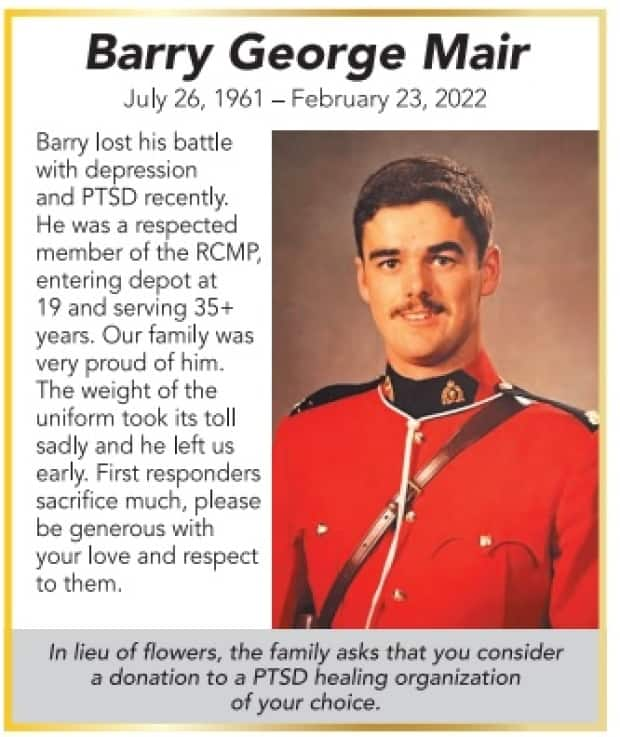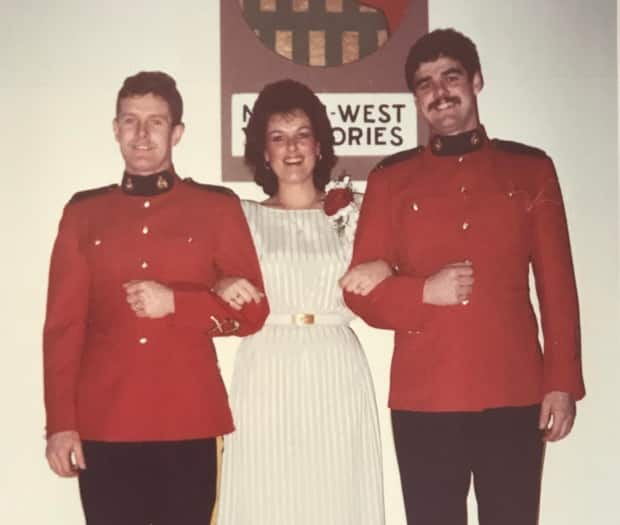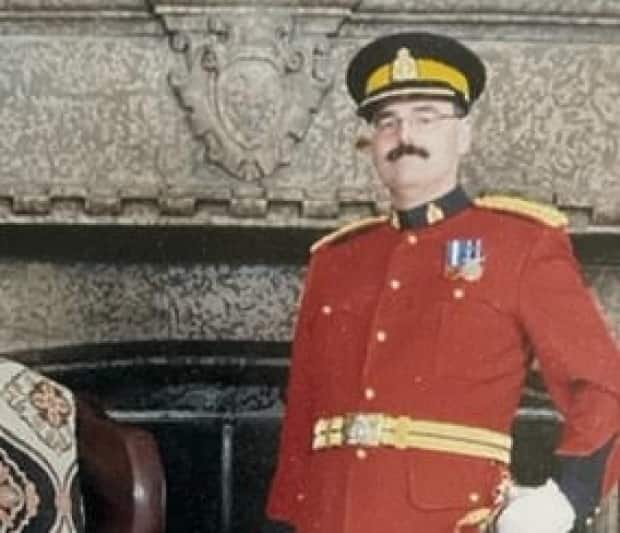N.W.T. family opens up about former RCMP officer's struggle with PTSD

WARNING: This story discusses suicide.
Norm Mair of Yellowknife still thinks about the visit he made many years ago to Edmonton, where his brother Barry was then living.
It was typical for the family to stay with each other when visiting from out of town, but this time was different. Barry had suggested Norm get a hotel room instead.
"He just ... he didn't have the capacity at that time, to have people over at his home," Norm recalled.
That hurt Norm, but he supported his brother. Barry was clearly struggling with something bigger.
"I knew that there was something deep and powerful going on within him, that he would be in such a state that he couldn't handle having family over at his home," Norm recalled.
That "something" was Post Traumatic Stress Disorder (PTSD), a psychiatric disorder that affects people who have experienced or witnessed a traumatic event.
Barry, a former RCMP officer, struggled with PTSD for years. In February, he died by suicide at 60.
Norm and the rest of Barry's family consider his PTSD a workplace injury — the product of his many years working as a frontline officer in B.C., witnessing more traumatic events than most people could imagine.
"The weight of the uniform took its toll sadly and he left us early," reads Barry's obituary published in the Yellowknifer.

Monday is PTSD Awareness Day in Canada, and Barry's family has decided to share their story — about seeing their loved one struggle with the disorder and its impacts, about their sometimes frustrated efforts to understand and support him, and about Barry's death by suicide.
They hope to raise awareness of PTSD as a devastating and even deadly illness that is best treated as early as possible.
Wry humour, helpful nature
Barry did not always come across to people as a troubled individual. Norm describes him as "good-natured, smart, and witty."
"He had this impish nature about him, with a wry sense of humour. Yeah, he enjoyed being around family and friends."

Barry also loved animals, especially dogs, and he liked being helpful to others. That's why he got into policing, according to Norm.
"These traits or dispositions, the PTSD hammered pretty hard later in life, but they were still there to a degree," Norm recalled.
Barry's other brother, John Mair, said that since Barry's death earlier this year, the family has been overwhelmed by messages from people across Canada who knew or worked with Barry. Many said how much they appreciated working with him, or described how he had helped them at one time or another.
"He was never one to blow his own horn. He was quiet behind the scenes, always trying to help, improve the situation," said John, from his home in Shawinigan, Que.
As an RCMP officer, Barry Mair worked for many years on general duty in Surrey and Fraser Lake, B.C. He also spent a few years with the Yellowknife RCMP, working in informatics, before moving onto Edmonton. He retired from the force in 2016.
The Mair family cannot trace Barry's PTSD to any one incident or experience. Rather, they describe it as the result of years working on the frontline. John thinks his brother's years in Surrey took an especially heavy toll.
"It's one of the toughest detachments in the RCMP in Canada. You're exposed to many incidents, many traumatic incidents," said John, who is also a former RCMP officer.

John says the first symptoms of Barry's PTSD began appearing in the early 2000s. Barry shared some of his experience then with his family, but John remembers a reluctance to reach out for help, making it difficult for Barry's loved ones to recognize how serious things were, or would become.
"It comes a little bit as a result of the corporate culture within the RCMP dealing with traumatic incidents in the '80s, in the '90s. It was always a stiff upper lip to deal with it. Get on with it. Move on, and don't show any weakness," John said.
"And Barry expressed that a few times as one of the factors that prevented him, or was responsible for him in the initial stages of not actually reaching out for help."
John says things have since changed within the RCMP, and the force has become more proactive about PTSD and other similar workplace injuries.
'We became more aware of it as he opened up'
Meanwhile, Barry's PTSD gradually took a greater and greater toll. His physical health deteriorated, and he struggled with alcohol and substance abuse toward the end of his life.
John describes how Barry eventually told them about his struggles. John wishes it had happened sooner.
"We did try to play an active role in his therapy, but again, it was only later on that we were able to play some form of role, because of a denial that took place, and his failure to reach out for help to deal with it earlier," John recalled.
"We became more aware of it as he opened up."
In recent years, Barry seemed to have made good progress with some intense psychological and medical therapy. He worked hard to get better, Norm said.

"We saw our brother coming out of the darkness," Norm recalled. "The light seemed to be coming back on, after his efforts."
That's made Barry's death difficult for his family to understand. Grappling for a reason, they've found none that makes sense.
"We believe it was accidental," Norm said.
Barry died the same day his beloved dog — "his best friend," according to Norm — had been euthanized after suffering from cancer. Barry was distraught, and Norm says his brother fell back on a familiar coping mechanism by turning to alcohol and substance abuse.
"We feel he didn't mean to take his life. He meant to end the pain. But under the influence, he couldn't see the difference," Norm said.
"When you take your own life, whether intentionally or accidentally, it does not end the pain. It just transfers it, sadly, to those you love the most. And we very strongly feel Barry would not have wished to do this."

The Mairs thought long and hard about sharing details about Barry's struggles, and his death by suicide. There were some "intense discussions," John said.
They want people to be more aware of how insidious PTSD can be, especially if it's undiagnosed and untreated. They want to inspire people suffering from PTSD to seek support and help, as early as possible. And they advise families and loved ones to research and learn how best to help.
"We're not being critical of our brother, or of fellow sufferers who may have taken their life or may be considering it," Norm said.
"Our core hope is [for Barry's] life to be of help to others, and our experience to be of help to others."
If you or someone you know is struggling, here's where to get help:
This guide from the Centre for Addiction and Mental Health outlines how to talk about suicide with someone you're worried about.

 Yahoo Movies
Yahoo Movies 